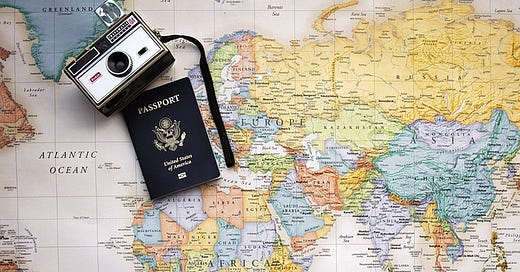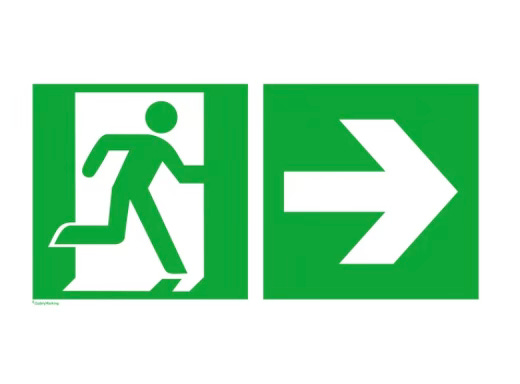There are ways of leaving the US without jumping through the Visa hoops associated with temporary or permanent residency in another country. Let’s consider a few and meet some people doing just that.
Option #1: Europe & The Schengen Shuffle
If you want to live in Europe but don’t want to take the time to acquire a long-term visa, there is an alternative. It is commonly called The Schengen Shuffle. As a US Passport holder, you can travel to countries within the Schengen area for 90 days without a visa.1 While most European countries are part of the Schengen area … not all are. If you want to do The Schengen Shuffle, you plan your itinerary to move in and out of the Schengen Area, ensuring you don't exceed the 90-day limit.2
Option #2: Travel the World
But you don’t have to limit your travel to Europe. Some people shuffle between countries around the world. If this appeals to you, I suggest you subscribe to Brent and Michael are Going Places. Brent and Michael decided in 2017 to sell their home in Seattle and travel the world as “digital nomads”. They move to a new country every few months, supporting themselves by working remotely. They have lived in over 30 countries for at least one month and visited many more.
Of course, you don’t have to be a digital nomad … many retired couples start with this approach to find the perfect place to land.
Option 3: Give Yourself Up to 1 Year
There are countries where a US Passport holder can live for up to one year without a visa. Now, some of the countries on this list I would not even consider because of safety concerns and/or economic challenges … but there are a few that you might find acceptable. You might, for example, go to Panama for 180 days. If you like it, you can apply for a remote worker or retiree visa while living in the country.
Get Out of Dodge
While the above strategies may enable you to live outside the US without a visa, there is still much to consider.
Do you have a passport and when does it expire?
What are you going to do with all your stuff? Your home? Your car? How will you dispose of or store everything? This article will help you deal with your “stuff”.
You will want to keep a US address. Will you pay a monthly fee to a virtual post office or rely on a relative?
You will want to keep a US bank account. Though we keep most of our investments with Vanguard, we opened a Schwab brokerage account and bank account before leaving the US. The Schwab ATM card reimburses foreign ATM fees, and we have found their currency exchange rates and fees are very competitive.
If you have a US credit card, you will need a way to do 2-step verification. Many credit cards text your US phone number to verify a purchase. There are a variety of strategies, but you should decide before you leave the US. There are also e-sims that will make using your cell phone in different countries much cheaper.
You will want to pay attention to important dates, like when your US Driver’s License expires. If you ever plan to settle down, many countries will allow you to exchange a valid (i.e. current) US driver’s license with theirs. But if it has expired, you may be required to attend a local driving school.
What are you going to do about health insurance? You can learn about health insurance for long-term travelers here.
You need to understand currency exchange. If you are not familiar with this topic, please read this post.
This is not a complete list. Yes, moving out of the US takes work.
Money Makes the World Go Around
As I typed the title above Liza Minnelli’s and Joel Grey’s voices popped into my head. I don’t mean to be crass, but … the truth is nearly everything is easier if you have money.3 As I have written before, money allows you to weather mistakes (e.g. forego your security deposit when the apartment is too cold), enjoy a 14€ Cosmopolitan, and ride out exchange rates.
It will be difficult to forecast your expenses in another country…but there is help on the internet.4 We have disclosed what we spent last year … however, keep in mind we own our home and car.5 Brent and Michael have shared their annual expenses in 2023 and 2022. However, Brent and Michael are travel hackers extraordinaire. They house-sit; book hotel rooms, cancel, and then book the same hotel when a cheaper rate becomes available, etc.
If you are trying to figure out if you have enough saved…you may want my spreadsheet, which I affectionately call “When Will I Run Out of Money.” You can find information and access to the spreadsheet here.
In Summary
While there are strategies for leaving the US without initially jumping through the bureaucratic hoops associated with getting a visa … it will still take time and a lot of planning. So much, in fact, that you might want to land somewhere for a few years. If so, our next installment addresses common types of visas for Americans wishing to leave the US.
Espero que isto ajude, Tchau, beijinhos…
Nanc
Editor’s Note: I am not sure this qualifies for non-visa travel, but it appears that a US cruise line is offering a four-year escape to coincide with the Trump presidency. At around $160,000 per person, this is not a bad deal and includes more than 425 ports in 140 countries. (I want to thank my friend Julie for bringing this to my attention.)
The previous statement was true when it was written in late 2024. However, in early 2025, the UK began requiring a visa to travel to their country. It is expected that the EU will also start requiring visas in 2025. Though these are not time-consuming or expensive propositions, please keep an eye on such requirements to avoid costly delays.
Please note countries are added to the list from time to time.
I was surprised that Musk’s comment during the campaign that a Trump victory could lead to "temporary hardship" for most Americans didn’t get more coverage. Of course, when you have billions in the bank you can weather just about any storm…then invest the cash after the market crashes.
Several sites attempt to compare the cost of living between countries and cities. While all of these sites rely on crowd-sourced data, they can be a good place to start. You might want to look at a site like Numbeo.
We are not subject to Portuguese income taxes at this time because we came under the NHR tax scheme. However, Portugal has suspended this program. New residents are subject to Portuguese taxes.









This is fascinating to read. As a European citizen I always take for granted the opportunity to travel visa-free to most of Europe.
Hi Nancy. Great post that I hope will make people realize that to move abroad requires a lot more than a knee-jerk reaction. We've all met people who think they can buy a plane ticket, take their US dollars, and expect to find things are "just like at home" when they land. Not so much.